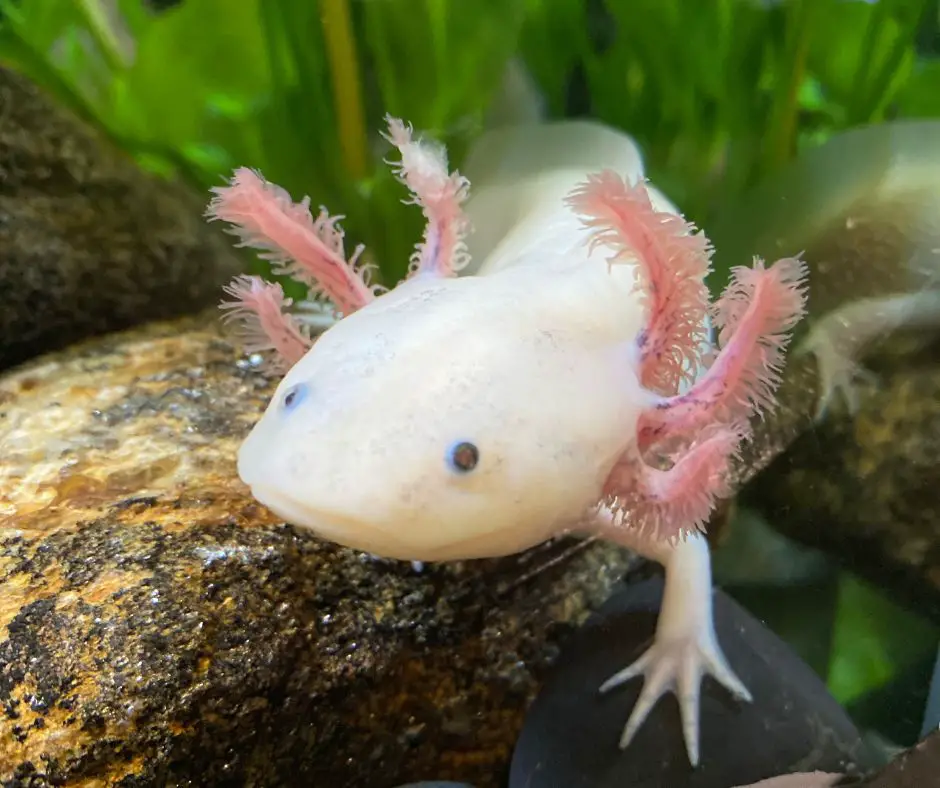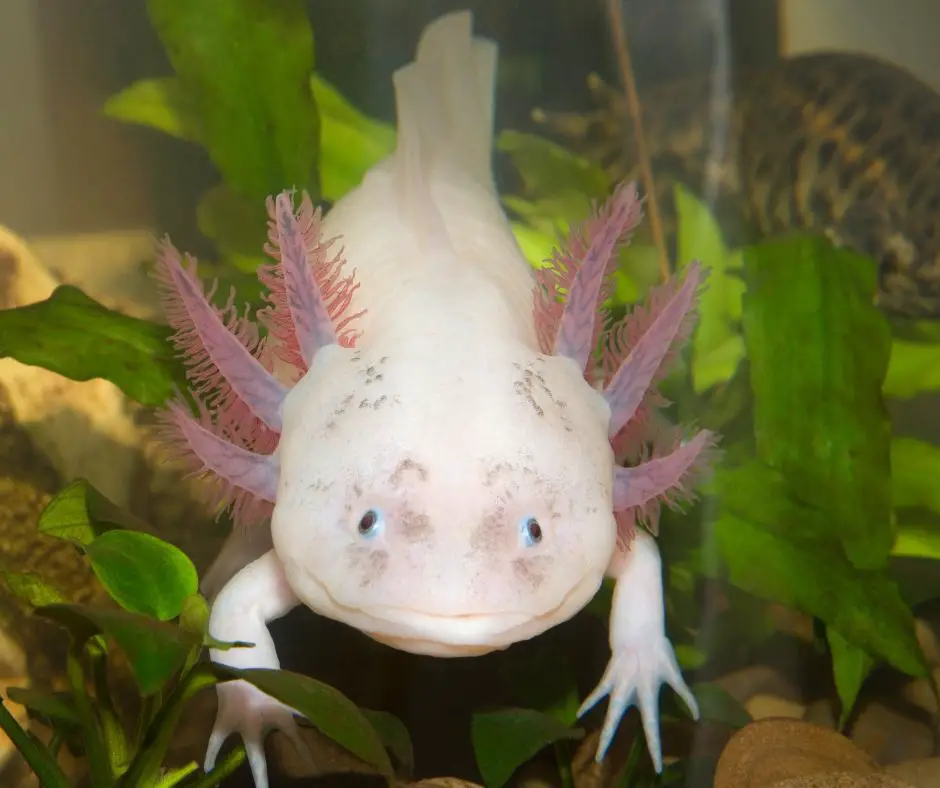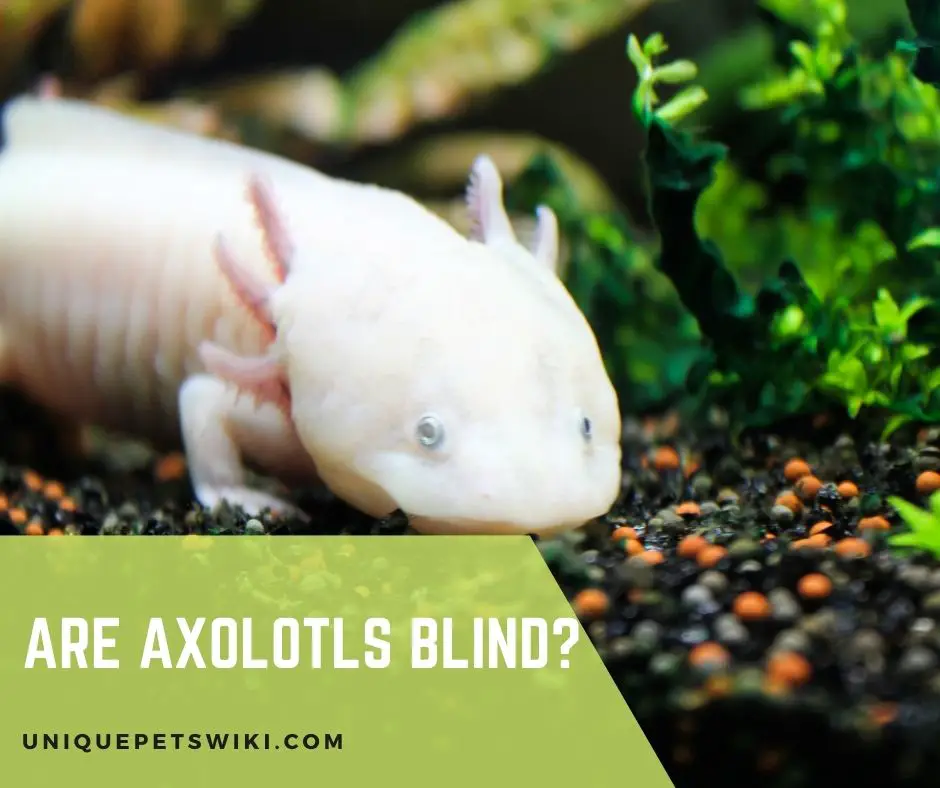Axolotls are independent and unique creatures. They are amphibians that like to dwell in freshwaters.
Axolotls are carnivores and feed on mollusks, insects, worms, and other arthropods. Many people are perplexed by axolotls’ ability to seek food and ask queries like “Are axolotls Blind?”
The eyes of axolotls are round and lack eyelids. When you stare into their eyes, it appears that they are blind. However, if you approach them, they will escape. If you own an axolotl, it is, therefore, essential to understand their eyesight.
The purpose of this article is to educate readers about axolotl eyesight and how it differs from that of other amphibians. The post will also inform readers about axolotls’ abilities to locate food and its owner despite their poor eyesight.
Contents
Are Axolotls Blind?
Axolotls are not blind, although their eyesight is poor in comparison to other amphibians. Because axolotls do not have eyelids around their eyes, they do not blink rapidly. They use their senses to find food, objects, and their owner in the surroundings.
Axolotls can detect even the tiniest movement in their surroundings. As soon as you walk into the room, the axolotl becomes active and alert.
This is due to their ability to interpret sound waves, not because they see you. With their blurry vision, axolotls may see moving objects and distinguish between various colors.

Are Axolotls Sensitive to Lights?
Yes, axolotls are light-sensitive. Amphibians have eyelids like other mammals. Axolotls are light-sensitive because they lack both upper and lower eyelids.
The function of the eyelids is to reduce the amount of light that enters the eye. When axolotls are exposed to the bright light of high intensity, it can induce irritation and stress.
Red is more visible to axolotls than other colors. However, unlike other amphibians, they are unable to distinguish between colors and see multiple colors.
Axolotls can see in the dark better than in the light. This is due to a lack of eyelids once again. Due to the penetration of low-intensity light, they can see moving objects in low light.
How Do Axolotls Find Their Food in the Wild?
As mentioned above, axolotls rely on their senses to find food in the wild. With their blurred vision, they can see in low light, which is why they don’t come out during the day.
They come out in the dark to hunt and locate food. Axolotls eat primarily from the water. They catch and eat moving insects, worms, and other arthropods that are free to move around in the water.
Although axolotls have teeth, they do not crush or digest their food in the mouth. Amphibians mechanically digest the food in the mouth, but axolotls directly swallow the food into the stomach.
Axolotls only require water to thoroughly swallow the insect or worm. Water aids in the moisturization of the esophageal tract and the easy passage of food into the stomach.
Do Axolotls Recognize Their Owners?

No, they do not recognize their owners, but it is feasible with proper training. Axolotls are aware of their surroundings, yet it is difficult for them to determine who is their owner.
Axolotls, on the other hand, are aware when their owner enters the room to feed them. Because axolotls are aware when it is feeding time and that their owner is around to provide food.
This is why axolotls get active when you enter the room and try to approach you to acquire their food. If they are given specific training from an early age, axolotls can recognize their owners.
They can know their owners by using their sense of smell and interpreting sound waves.
How To Know If Your Axolotl Is Blind?
It’s not easy to tell if your axolotl is blind or not. If your axolotl becomes stressed and its eyes become irritated, he or she is not blind but has poor vision.
Second, move the red chart in front of their eyes; if their eyes follow the movement of the chart, they are not blind.
Can Axolotls Regenerate Their Eyes?
The potential of axolotls to regenerate body organs is well-known. They may also regenerate essential body parts such as the eyes and brain.
Macrophages are immune cells that play a vital part in tissue and organ regeneration. When axolotls sustain an eye injury or lose eye tissue, they can regenerate those tissues.
When an axolotl is injured, the epidermis begins to grow at the wound site. At the same time, the healing process is aided by a reduction in inflammation at the injury site.
After the epidermis develops, blastema develops, which leads to the recovery or regeneration of injured portions or organs.
Aqueon Aquarium Starter Kit with LED Lighting 10
- All the equipment needed to get started in one box!
- Low profile full hood contains vibrant cool white LED lighting to bring your aquatic environment to life
- Filter has a red LED light that flashes to indicate when it’s time to change the cartridge
- Simply add your favorite style of plants and decor
- Preset heater will keep your aquarium temperature at a constant 78 degrees, appropriate for most tropical fish
Last update on 2022-12-30 / Affiliate links / Images from Amazon Product Advertising API
In Conclusion
Axolotls are amphibians with a history of having poor vision. Their eyes are round and lidless, with red, black, or pink inner eyeballs. To find food, axolotls rely on their capacity to sense movement in their surroundings.
Worms, insects, and arthropods are the most common prey for them. They are light-sensitive due to the lack of eyelids.

